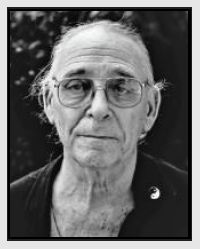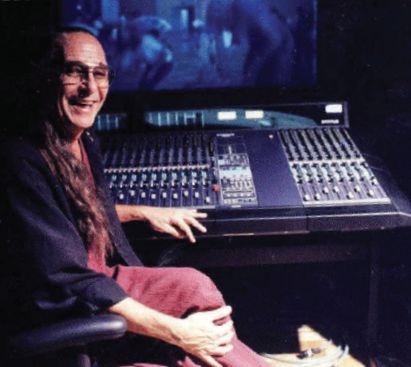Richard Portman, Re-recording Mixer
April 2, 1934 – January 28, 2017

Everyone knew Dick Portman. He was a major presence in the Post Sound world for three decades with a list of credits to prove it. I guarantee that anyone who met him has a Portman story; we heard quite a few of them when he was honored in 1998 by the CAS with the Career Achievement Award. Unlikely as it seems, most of them are probably true. And everyone knows the magic he brought to the soundtracks of the movies he mixed, his mad skills and dexterity, covering the console in a flamboyant solo act.
I never spent time with him on a mix stage with the candles, the incense, crystals, the sorcerer’s cloak and all that legendary weirdness, but I will always remember the first time we met. I was a big fan of the groundbreaking Robert Altman films of the ’70s, Nashville, California Split, as well as The Godfather and The Deer Hunter. I was very excited when the re-recording mixer of those masterpieces of sound was to be teaching his specialty at the UCLA School of Motion Pictures and Television back in 1980.
My fellow students and I awaited his arrival in the mix stage in Melnitz Hall, a room full of baby auteurs and future rulers of Hollywood, expectantly wondering what magic this genius would bring to our projects. Finally he showed, just a little late, and our expectations were exceeded, if not shattered. A tall, lanky fellow burst into the room, long straight pony-tailed hair held in place by a red, white and blue headband, tie-dyed T-shirt, jeans and flip-flops, bounding over the seats, all the while cleaning the seeds and stems from a small box of weed from which he proceeded to roll a joint. Stopping short of the front of the room so we had to turn to see him, he certainly had our full attention and the lesson began. The man knew how to make an entrance.
Not everyone in that class aspired to a career in sound, I certainly didn’t; we just wanted to make our films sound better. Nevertheless, everyone was treated to a journey to a heretofore undiscovered realm of filmmaking, the world of sound. We were dazzled by his knowledge, his stories, his passion and creativity. Comforted by his generosity, his patience and his desire to teach us at least a little of what he knew; kind of like filling a water balloon with a fire hose.

Beneath all the wild flash and mad genius, one could not help but be blown away by his profound understanding of the science, the engineering and all the underpinnings of sound recording and mixing. He was after all, born into the business. His father, Clem Portman, was one of the major re-recording mixers of the previous generation, that is, from the very beginning of the Sound Era. Richard’s rigorous and creative application of those principles, with his natural ability to share his excitement about his life’s work, inspired his students to hear and see in a new way. As loaded as he might be (or was he?), he knew that shit cold. He said at least once, that the Nagra was the worst thing to happen to sound because it made it too easy; any knowledge-free undisciplined idiot could now record sound. You could never mistake Porto’s freewheeling style for a lack of discipline and attention; five years in the Marines brought a sense of order to the proceedings.
If you were willing to hold on and follow him, man, you could learn a lot! Something he talked about constantly, signal path and integrity, unity gain, impressed us so much that my partner and I later named our new company One To One Sound. He made a big point that sound should be treated on par with camera. He said that we were not “recording” sound, rather that we were “shooting” sound, and we deserved the same respect that camera received and could get it if we spoke of it similarly. Then there were the fringe benefits and extracurricular activities, including going out to the desert to record stereo bus-bys for Honeysuckle Rose, sailing trips in Santa Monica Bay on Richard’s boat (don’t show up empty handed!) or hanging out at his place in Venice, soaking up wisdom or whatever.
It wasn’t just the incredibly deep reservoir of knowledge that he offered for a few of his first students, it was the opportunity to observe a sound professional at the height of his passion, skill and creativity. Demonstrating that this was not just a viable career path, but respectable and satisfying as well. We were all going to be great and successful filmmakers, we were sure of it. But here was a glimmer of another way, combining art, science, craft and filmmaking that also was a lot of fun. You could even win an Oscar!
I finished film school, encouraged by Richard to further develop my skills by doing sound on several more student since no one wanted to do sound at UCLA, there must be plenty of openings out there. While we worked on our scripts and waited for Hollywood to call, my partner and I bought a Nagra, some mics and radio mics, put up a shingle … and waited … and waited.
I met a wonderful new mentor, the late, great Production Mixer David Ronne, who also pointed the way to sound. He gave me my first job in the business (thrown off the set by Bob Fosse!) and sold me that first Nagra. David and Richard collaborated memorably on the Oscarnominated On Golden Pond—two masters at their best. I always figured that if you were making a movie and it wasn’t certain that the cast would be around (as in alive) for looping, you’d hire David on the front end and Porto to finish.
Eventually, the jobs started coming, not writing and directing, and thirty-six years later, One To One Sound lives on while I record and mix movies and television. I did production sound on several projects that Richard re-recorded. Early in my career, I visited him on the dub stage where he was mixing Sam Shepard’s directorial debut, a very challenging but inconsequential little movie. When I entered the sanctum sanctorum, he made a point of effusively greeting me so that Sam would notice, as a hero and the savior of the soundtrack. It wasn’t a very good movie but it sounded great!
I am incredibly lucky to have encountered Dick Portman at such a formative moment in my life. Not just for the chance to bask in his genius and enjoy his company but even more because he was such a fantastic, inspiring and encouraging teacher who always challenged us to dig deeper and go further. It is fitting that he transitioned into full-time teaching at Florida State University, where he would influence several generations of filmmakers at a program that was essentially built around him. As a mixer, Richard Portman changed the way movies sound, as a teacher, he changed lives. I can’t think of a better legacy for this great man.
–Steve Nelson CAS